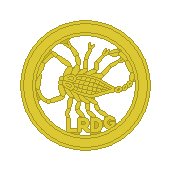LRDG
| Long Range Desert Group | |
|---|---|

LRDG badge depicting a scorpion within a wheel
|
|
| Active | July 1940 – August 1945 |
| Country | United Kingdom |
| Branch | British Army |
| Role |
Reconnaissance Intelligence gathering Raiding operations |
| Size | Maximum 350 all ranks |
| Part of |
Western Desert Force Eighth Army |
| Nickname(s) |
Libyan Desert Taxi Service Pattuglia Fantasma (Italian: Ghost Patrol) |
| Motto(s) | Non Vi Sed Arte (Latin: Not by Strength by Guile) (unofficial) |
| Equipment | Chevrolet or Ford trucks, Willys Jeep |
| Engagements | |
| Disbanded | 1 August 1945 |
| Commanders | |
| Notable commanders |
Ralph Alger Bagnold Guy Lenox Prendergast John Richard Easonsmith David Lloyd Owen |
The Long Range Desert Group (LRDG) was a reconnaissance and raiding unit of the British Army during the Second World War.
Originally called the Long Range Patrol (LRP), the unit was founded in Egypt in June 1940 by Major Ralph A. Bagnold, acting under the direction of General Archibald Wavell. Bagnold was assisted by Captain Patrick Clayton and Captain William Shaw. At first the majority of the men were from New Zealand, but they were soon joined by Southern Rhodesian and British volunteers, whereupon new sub-units were formed and the name was changed to the better-known Long Range Desert Group (LRDG). The LRDG never numbered more than 350 men, all of whom were volunteers.
The LRDG was formed specifically to carry out deep penetration, covert reconnaissance patrols and intelligence missions from behind Italian lines, although they sometimes engaged in combat operations. Because the LRDG were experts in desert navigation they were sometimes assigned to guide other units, including the Special Air Service and secret agents across the desert. During the Desert Campaign between December 1940 and April 1943, the vehicles of the LRDG operated constantly behind the Axis lines, missing a total of only 15 days during the entire period. Possibly their most notable offensive action was during Operation Caravan, an attack on the town of Barce and its associated airfield, on the night of 13 September 1942. However, their most vital role was the 'Road Watch', during which they clandestinely monitored traffic on the main road from Tripoli to Benghazi, transmitting the intelligence to British Army Headquarters.
...
Wikipedia
